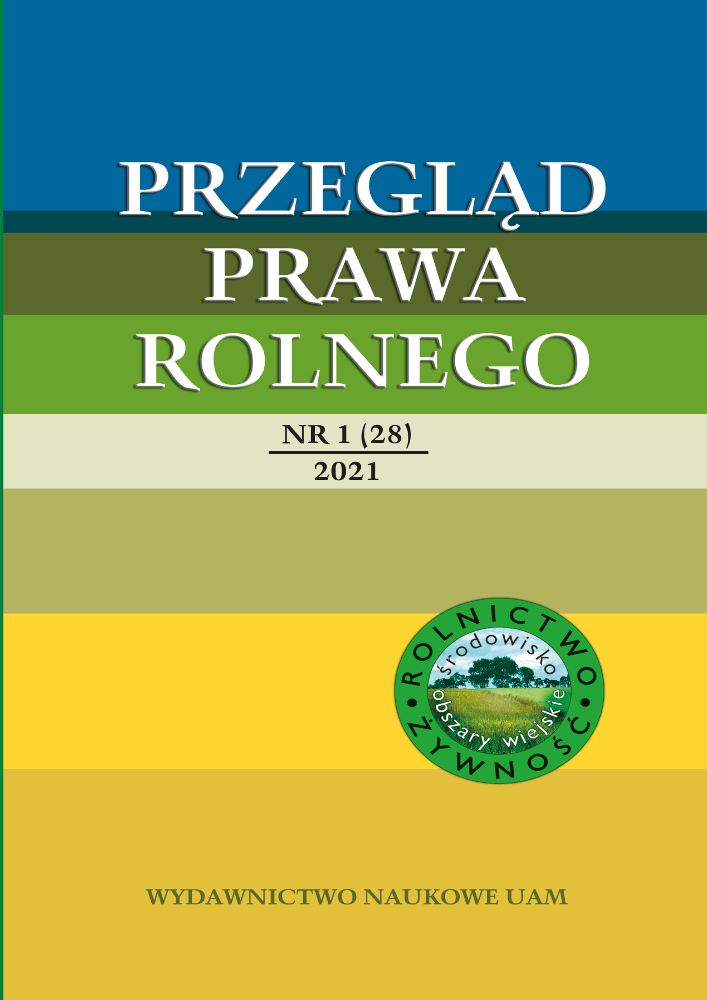Abstract
The aim of the considerations was an attempt to outline the mutual relations between restrictions of trading in agricultural real estate introduced by the Act on shaping the agricultural system, food security and sustainable food systems, as well as to verify to what extent Polish regulations concerning the agricultural real estate may be perceived as an instrument to ensure food security and whether the legal solutions adopted are consistent with the “Farm to Fork” Strategy. The article presents the basic goals and assumptions of the “Farm to Fork” Strategy, taking into account the European Green Deal, explains the concept of food security, and outlines the basic instruments for restrictions of trading in agricultural real estate introduced by the Act on shaping the agricultural system. In the light of these findings, an assessment of the introduced solutions restricted trading in agricultural real estate in the context of food security and the “Farm to Fork” Strategy was made. The analysis carried out in the article leads to the conclusion that both the principle of purchasing agricultural real estate by individual farmers and the requirement to run a farm on the purchased agricultural real estate contribute to ensuring food security, but they only indirectly affect the implementation of the “Farm to Fork” Strategy.
References
Bukowski Z. (2012), Zrównoważony rozwój w systemie prawa, Toruń.
Campbell B.M. i in. (2016), Reducing risks to food security from climate change, „Global Food Security” 2016, t. 11.
Frankenberger T.R. (red.) (2003), Household Food Security: Concepts, Indicators, Measurements: A Technical Review, New York – Rome.
Golay Ch., Özden M. (2005), The right to food. A fundamental human right affirmed by the United Nations and recognized in regional treaties and numerous national constitutions. Part of a series of the Human Rights Programme of the Europe-Third World Centre, Geneva.
Kenig-Witkowska M. (1998), Koncepcja sustainable development w prawie międzynarodowym, „Państwo i Prawo” nr 8.
Korzycka M. (2017), Prawa człowieka w prawie żywnościowym, w: M. Korzycka, P. Wojciechowski, System prawa żywnościowego, Warszawa.
Leśkiewicz K. (2012), Bezpieczeństwo żywnościowe i bezpieczeństwo żywności – aspekty prawne, „Przegląd Prawa Rolnego” nr 1(10).
Leśkiewicz K. (2020), Zrównoważone systemy żywnościowe w kontekście reformy Wspólnej Polityki Rolnej – aspekty prawne, „Przegląd Prawa Rolnego” nr 2(27).
Sitek M. (1999), Sustainable development– ciągły czy zrównoważony rozwój?, „Państwo i Prawo” nr 2.
Maxwell S., Smith M. (1993), Household food security; a conceptual review, w: S. Maxwell, T. Frankenberger (red.), Household Food Security: Concepts, Indicators, Measurements: A Technical Review, New York – Rome.
Mechlem K. (2004), Food Security and the Right to Food in the Discourse of the United Nation, „European Law Journal” nr 10(5).
Olejarczyk E. (2016), Zasada zrównoważonego rozwoju w systemie prawa polskiego – wybrane zagadnienia, „Przegląd Prawa Ochrony Środowiska” nr 2.
Pastuszko R. (2019), Dostęp do zasobu gruntów rolnych w procesach globalizacji. Zagadnienia prawne, Lublin.
Prokurat S. (2017), Ekonomiczne i prawne aspekty obrotu ziemią w Polsce na tle rynku europejskiego, „Acta Universitatis Wratislaviensis. Ekonomia – Wroclaw Economic Review” nr 23(3).
Rodríguez-Cachón T. (2019), Commission I, National report Spain, European Congress of Agricultural Law – 18–21 September 2019, Poznań (Poland).
Srogosz T. (2020), Systemy żywnościowe w kontekście Zrównoważonych Celów Rozwoju – kilka uwag w czasie pandemii, „Przegląd Prawa Publicznego” nr 6.
License
Copyright (c) 2021 Paweł Wojciechowski

This work is licensed under a Creative Commons Attribution-ShareAlike 4.0 International License.





